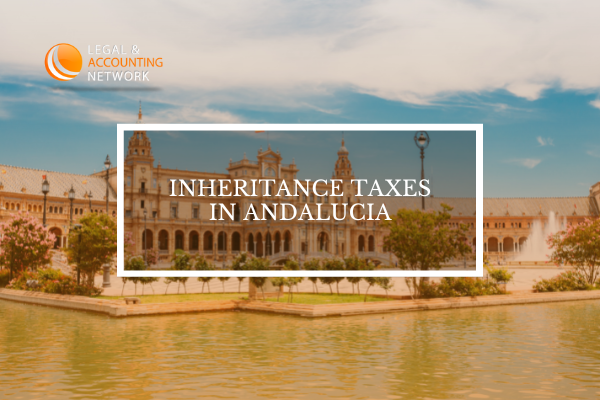What is the Inheritance Tax in Andalucia?
Inheritance tax is a levy on assets inherited from a deceased person.
Whereas in the UK it is the estate of the deceased that it is taxed, in Spain and Andalusia, the inheritance tax is paid by the recipient of a bequest rather than the estate of the deceased.
On the other hand, a donation is when a living person assigns money or property to another person.
The main difference between a donation and an inheritance is that, under the donation, the gifted property or asset is owned immediately by the recipient, while this is not the case when a person leaves property to another individual by means of a will.
In any event, both the will and the inheritance need to be formally accepted by the beneficiary by granting a public deed in order to have legal effect.
Both taxes although they are of different nature are paid through the same tax, the Inheritance and Gift Tax.
A few months ago, in Andalusia there was a basic benefit whereby one was exempt from paying inheritance tax on the first million euros inherited.
But since the Andalusian Government approved a new decree, a 99% bonus has been added for those assets valued at more than one million euros. This means that heirs and people who exceed that amount will only pay 1% tax on the actual value.
It should be noted that this tax applies to all types of shares, properties, etc. located in Andalusia.
All this means that in Andalusia the Inheritance Tax is practically eliminated.
¿Who can benefit from this inheritance tax reduction?
Well, to begin with, only direct relatives (children and parents) and spouses and even de Facto couples registered in the Andalusian registry of de Facto couples.
Whether you are a resident or non-resident for tax purposes, if you own assets in Spanish territory, your heirs are obliged to declare these assets in Spain as part of the inheritance if you die. This is an obligatory formality, regardless of your nationality and residency status, regardless of whether one is the donor, the deceased or the beneficiary.
But one rule will apply and that is that the deceased should have lived in Andalucia for most of the 5 years prior to his/her death. Had the deceased lived for a longer in another Autonomous Community within that period, the rule of that Autonomous Community will have to be applied to the estate.
If both the deceased and the beneficiary are non-residents, they will be eligible for this relief if the most valuable assets are located in Spain.
It is also important to inform the tax authority of their country of residence of the declaration of these assets in Spain.
On the other hand, it is worth mentioning that this allowance can only be accepted if the origin of the inheritance can be clearly proven and if it is specifically mentioned in the will, which must be signed in front of a notary.
In addition, you have a period of 4 years to reclaim the inheritance tax in case you have overpaid it.
When is inheritance tax paid in Andalusia?
In order to determine this question it is important to clarify that although the inheritance rules apply to the whole of Spain, inheritance tax is settled differently in each of the Autonomous Communities.
The Spanish Tax Agency is responsible for determining whether and how much inheritance tax is payable on Spanish assets. In addition, your native country, for example, may also require the inheritance to be declared, depending on the tax residence of the deceased.
Officially we have a period of 6 months to pay the inheritance tax from the date of death, but there is the possibility that the lawyer can request an extension of 6 more months if he justifies the reasons for the extension of the period, but bear in mind that if he/she does not justify the reasons and does not declare the tax on time, the heir will have to pay a percentage of interest plus a possible penalty.
The tax obligations expire four and a half years after the date of death, including fines.
I have no money to pay the inheritance tax, what can I do?
If you cannot pay this tax, you will not be able to register the property in your name in the Land Registry and this means that you will not be able to sell it either. So in this case you can follow one of 3 options:
First: If the deceased person has money in his or her bank account to pay the inheritance tax. The lawyer by means of a special administrative procedure could initiate a process to access this money in order to be able to pay the tax.
Second: If there is a buyer for the property, he/she can pay the inheritance tax through the down payment of the purchase by means of a purchase contract, therefore assuming an additional risk and accepting the payment of the inheritance tax in order to ensure that in the future he can sell his property.
The problem is that if a serious problem arises with the inheritance procedure, the buyer might lose part of his money.
Finally, and as a third option, one can wait for 4 and a half years until the deadline for paying the tax expires.
How much do I have to pay to the Inland Tax Office for an inheritance of money in Andalusia? Do I have to pay the same amount when receiving an inheritance of money as when receiving an inheritance of assets?
The answer is yes, as the sum will always be the value of what is received regardless of whether it is money or an asset.
How can I calculate how much inheritance tax I would have to pay in Andalucia?
To calculate inheritance tax in andalucia there are three aspects that must be taken into account: Taxable Base, the General and Autonomic Reductions and the Tax Quota.
- The taxable base
The taxable base will be different depending on whether we are dealing with an inheritance mortis causa, donation or, for example, if we are dealing with the payment as beneficiary of a life insurance policy.
- Apply the national tax reductions
When we have calculated the taxable base, the law establishes several reductions that are applied at a general level in all cases, and that can be applied based on whether or not a series of the following requirements are met: family relationship between both parties, if there is any disability on the part of the taxpayer, the amount of wealth that is owned by the heir before the death…
- Art 20 of the Spanish Inheritance and Donations tax Law
Once the circumstances are determined, the law applies a series of reductions based on pre-established limits. Art 20 of the Spanish Inheritance and Donations tax Law.
- Apply the regional tax reductions
Once the general reductions have been applied, each Autonomous Community has the capacity to apply regional reductions and improve the state reductions. For example in Andalusia
- Apply the tax rate
Finally, as the taxable base is already reduced, it is necessary to apply the tax rate that each Autonomous Community will set. Finally, the last calculation will consist of applying a coefficient that will change depending on the previous fortune of the taxpayer who has to pay the tax and his or her family relationship.






